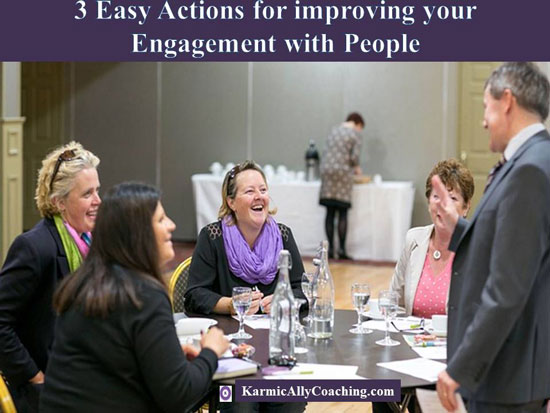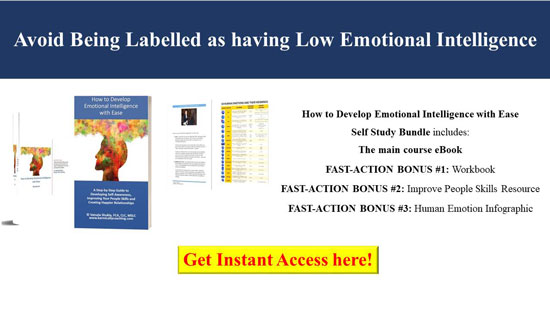This post has already been read 201 times!

Your people skills and relationship management skills in particular, become even more important as you climb the corporate ladder or wall.
Relationship Management includes the identification, analysis, and management of relationships with people inside and outside of your team.
It is the aspect of your Emotional Quotient or Emotional Intelligence that enables you to succeed in inspiring other people and helping them to reach their full potential.
The competencies associated with relationship management include influence, leadership, communication, conflict management, teamwork, and collaboration. All of these competencies require good people skills.
It’s also an area where many professionals fall short. The deficiency comes to light much later when they find their leadership skills or lack of it is affecting the next move on their career path.
Back in my corporate world days, our mid-year and annual appraisals had a section on People Skills. It was that 1 section that often created much conflict if the person being appraised was given a 3 or less on a score of 1 to 5.
Naturally everyone thought they were a 5. It’s human to rate ourselves higher than what others might feel or think.
That hasn’t changed much, and I still get to hear about the negotiations that take place on this 1 soft skill in the appraisal.
The defense line is usually the behavior of others or the achievement of performance goals.
What we often don’t realize is that soft skills are important and can be the difference in making or breaking your career. They are immeasurable, difficult to quantify, and your people skills are one of them.
What’s clear, though, is that today’s employers are just as interested in your soft skills as they are in your hard skills. I’d venture to say perhaps even more so.
Professionals with good Emotional Intelligence are competent in this skill
If you’re trying to demonstrate Executive Presence, then you must be able to show your people skills are developed.
People skills are important for demonstrating Relationship Management skills.
Transferable skills make you a good prospect, but your soft skills help you establish relationships, gain visibility, and create opportunities. It’s all about human connections.
If you do your job better than anyone, it doesn’t matter much if you don’t have the soft skills to back you up.
Your people skills allow you to interact with clients, customers, colleagues, employers, employees, potential clients, and this will serve your career.
Let’s look at that in more detail.
Compromise & Cooperation
Your people skills are important when it comes to offering ideas and suggestions, as well as giving and taking advice. To achieve success, you need compromise and cooperation.
It’s difficult to get that buy-in from others when you don’t possess people skills. You need to create an environment that invites open and honest communication where people feel they can share ideas and offer feedback.
Your career hinges on your ability to relate to others. Your people skills will encourage, support, and motivate others.
Insight & Sensitivity
Good people skills display your ability to maintain an interest in the feelings and concerns of the people around you. You can use this ability to encourage others to seek solutions and improve their problem-solving skills.
When you have good people skills you recognize that people have their own methods of working. You can learn how to effectively manage that.
If you know there are particular projects that create a negative reaction in someone’s mood, then you can approach it differently. You can improve morale and their mood by changing the way you deliver the news about a particular project.
Thanks to your people skills, they trust you and appreciate how you think about their feelings, thoughts, needs, and preferences. Your insight is making the workplace a better environment for everyone.
Persuasion
The ability to clearly communicate with confidence is key to persuading others. People skills play a key role in this. An ineffective way to communicate is to announce something you know will be unpopular while avoiding eye contact and quickly scuttling away without answering any questions.
Good people skills mean making eye contact, standing up strong and straight and delivering the information, answer questions, and persuade your audience to your way of thinking.
You can accept that they have different ideas, but it’s much easier to convince others that your way will work if you have the people skills to sell it.
However, the fact that you are prepared to listen to what they have to say, will inform your future decisions and may help you make your ideas even better in the meantime.
Leadership
People skills require teamwork. You have your own goals, but with people skills, you recognize that you need to cooperate to achieve the team’s goals, too. Every team will have a variety of viewpoints because that’s what happens when there are multiple people involved. It takes hard work to come to an agreement on a solution.
When you have people skills, your team will accept you and you can build your leadership skills and style. When you share your goals, people will sit up and listen, which will improve the productivity and environment of the workplace.
Ultimately, when you have good people skills you are placed in a better position to achieve the necessary results for you, your job, and the overall team.
As with any other skill, developing this skill requires time and practice. Try these 3 actions to jumpstart your habit building.

3 Easy Actions for improving your Engagement with People
One of the most basic ways to do this is to make the other person feel important. Make them feel that they and their viewpoints matter.
Don’t make them feel insignificant. If you don’t pay attention, come across as patronizing or condescending, raise your voice or fail to respond… you’re not endearing yourself to others.
You won’t make yourself likeable if you criticize unfairly or speak negatively about others.
Here are 3 easy and simple actions that work.
Pay full attention to the other person
Whenever you interact with another person, give them your total, undivided attention. No fidgeting with your watch, looking at your phone, or looking around the room. Show them you’re listening and engaged by responding accordingly.
The other person should feel as though they are the most important person on the planet for the duration of your interaction.
Get Curious about them – but in a healthy way!
Nothing makes someone’s day like someone showing interest in them. We’re talking genuine interest. So, get curious about others when you are interacting with them. Ask questions and be curious!
The interaction will be more enjoyable if you are engaged, which means to ask the right questions you need to be paying attention. It will be obvious if you try to fake it. Also, show curiosity in a healthy way. You don’t want to come across as a psycho!
Appropriate Elevation
This point is about timing. It’s crucial. Try to offer them a genuine compliment but be specific. Don’t put yourself down in order to do this. You don’t use criticism as a way to lift others up. It could be a past achievement that comes up organically in the conversation or something current. Compliment genuinely and as often as you naturally can.
So, you see, it really isn’t that difficult to get along with people, even the most difficult ones. You simply make them feel like they are valued.
Give the person you are engaging with your undivided attention, ask questions, and be totally curious about their life. Offer a genuine compliment.
That’s all you have to do when you sit down to interact with anyone. This is helpful for the people that you already know well and can also serve you as you meet new people.
Final Tips when exercising your people skills
I want to leave you with some particularly helpful, memorable tips.
- Approach people believing the best of them.
- Be positive.
- Find common ground with others, whether it’s a movie genre or a sports team.
- When you show sincere interest, it opens people up and you will learn more about them. This will also open a door to reciprocity, they will want to know more about you as well.
- Know when to engage in conflict and when to walk away, the latter is the right option the majority of the time.
- Allow others to be as open and honest as you wish to be. Don’t judge them.
- Don’t engage in playing games. You don’t have to manipulate others in order to build relationships with them.
- You only get what you give. So, be generous.
It comes down to demonstrating high Emotional Intelligence and polishing your people skills is a good place to start.
Additional Resource – Emotional Intelligence: The Basics for Professional Success
If you’re looking for a complete self-study course on Emotional Intelligence that includes Relationship Management, then click this link and get started.




 I adhere to the Certified Coaches Alliance Code of Ethics and Standards. A copy is available on request.
I adhere to the Certified Coaches Alliance Code of Ethics and Standards. A copy is available on request.
 Let's Talk through the Connect Form:
Let's Talk through the Connect Form: